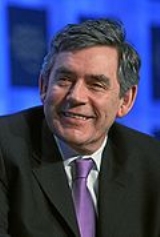
Her Majesty's Government
in the United Kingdom
. The Prime Minister and Cabinet
(consisting of all the most senior ministers
, who are government department heads) are collectively accountable for their policies and actions to the Sovereign
, to Parliament
, to their political party and ultimately to the electorate
.
1721 Sir Robert Walpole enters office as the first Prime Minister of the United Kingdom under King George I.
1742 Spencer Compton, Earl of Wilmington, becomes British Prime Minister.
1743 Henry Pelham becomes British Prime Minister.
1782 Charles Watson-Wentworth, 2nd Marquess of Rockingham becomes Prime Minister of the United Kingdom.
1830 Charles Grey, (2nd Earl Grey), became Prime Minister of the United Kingdom.
1908 H. H. Asquith of the Liberal Party takes office as Prime Minister of the United Kingdom, succeeding Sir Henry Campbell-Bannerman
1924 Ramsay MacDonald becomes the first Labour Prime Minister of the United Kingdom.
1943 World War II: British Prime Minister Winston Churchill and U.S. President Franklin D. Roosevelt set Monday, May 1, 1944 as the date for the Normandy landings ("D-Day"). It would later be delayed over a month due to bad weather.
1943 British Overseas Airways Corporation Flight 777 is shot down over the Bay of Biscay by German Junkers Ju 88s, killing actor Leslie Howard and leading to speculation the downing was an attempt to kill British Prime Minister Winston Churchill.
1945 World War II: the leaders of the three Allied nations, Prime Minister of the United Kingdom Winston Churchill, President of the United States Harry S Truman and Soviet Premier Joseph Stalin, meet in the German city of Potsdam to decide the future of a defeated Germany.

